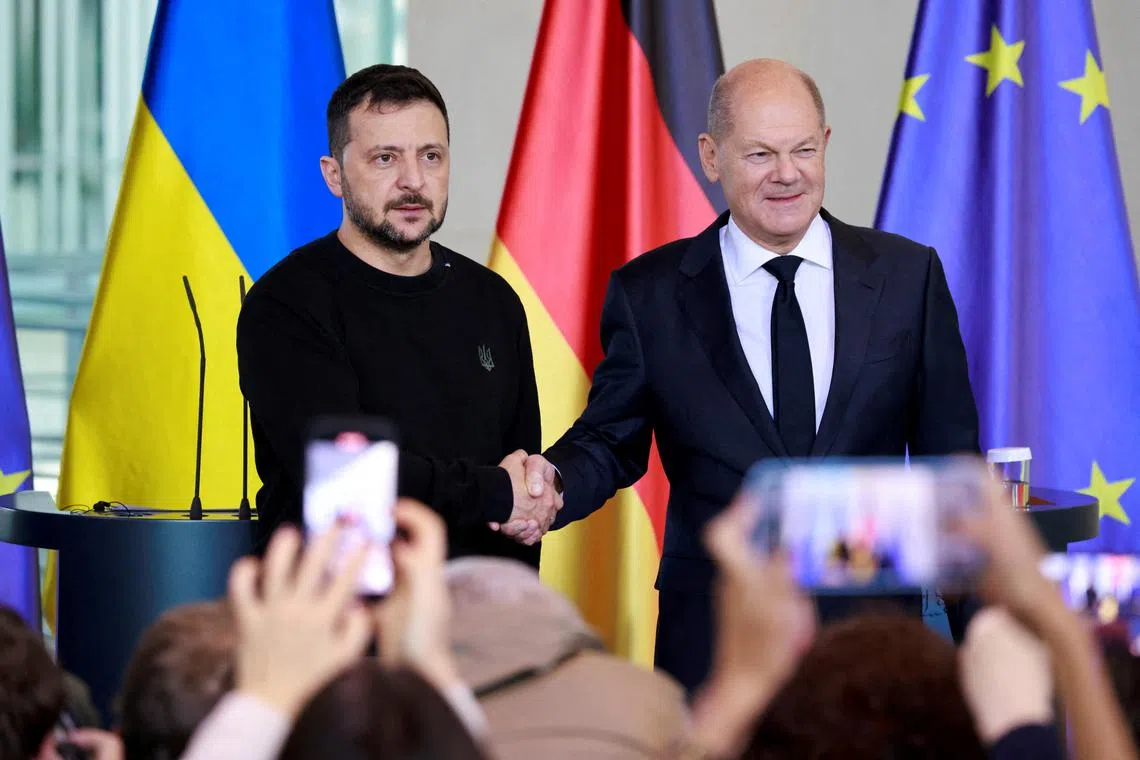Germany’s Scholz announces Ukraine military aid on surprise trip to Kyiv
Sign up now: Get ST's newsletters delivered to your inbox

German Chancellor Olaf Scholz (right) and Ukrainian President Volodymyr Zelensky shaking hands before talks in Berlin, Germany, on Oct 11.
PHOTO: REUTERS
Follow topic:
BERLIN - German Chancellor Olaf Scholz unveiled €650 million (S$920 million) of new military aid as he visited Kyiv on Dec 2, vowing Berlin would remain Ukraine’s biggest backer in Europe at a crucial moment in the war, with US President-elect Donald Trump set to return to the White House.
The visit, his first to Kyiv since the early months of Russia’s invasion in 2022
The political turmoil in Europe’s biggest economy adds to a growing feeling of uncertainty in Ukraine, with Russian troops advancing ever faster.
It is unclear how much Kyiv’s European allies can step up support for Ukraine if Trump cuts back help from its biggest backer.
Mr Scholz and Ukrainian President Volodymyr Zelensky met in an undisclosed location and reviewed military drones manufactured by Ukrainian and German companies. They also visited a hospital and spoke to people wounded in the war.
Mr Scholz was expected to hold talks with Mr Zelensky, whose government is urging Nato to invite Ukraine to join the military alliance at a meeting in Brussels this week.
While trumpeting Germany as Ukraine’s second-biggest weapons supplier after the US, Mr Scholz has repeatedly refused to send the Taurus cruise missile to Ukraine, fearing this could draw his country into a direct conflict with Russia.
He also drew fire from allies, including Mr Zelensky himself, for holding a phone call with Russian President Vladimir Putin for the first time in almost two years in November, which critics saw as targeted for domestic political gain.
“Germany will remain Ukraine’s strongest supporter in Europe,” Mr Scholz wrote on X, adding he would announce during his meeting with Mr Zelensky “further military equipment worth €650 million, which is to be delivered in December”.
The package includes Iris-T air defence systems, Leopard 1 tanks and armed drones, a German Defence Ministry spokesperson said on Dec 2.
“Winter is just around the corner, so there will also be winter equipment, as well as handheld weapons and warming devices,” the spokesperson said.
On Dec 1, new European Council president Antonio Costa and new European Union (EU) foreign policy chief Kaja Kallas visited Kyiv on their first day in office to demonstrate the EU’s support.
Backing for Ukraine is shaping up as a major issue in Germany’s election.
Mr Friedrich Merz, the conservative opposition leader who is on course to unseat Mr Scholz, has said Germany should send Taurus missiles, and at the weekend accused the Chancellor of scaremongering over the issue.
Mr Roderich Kiesewetter from the conservative Christian Democratic Union accused Mr Scholz of “campaigning on the backs of the Ukrainian population and at the same time... feeding the Russian fear narrative”.
“He is increasingly isolating Germany and endangering our security,” he told the Dec 2 Augsburger Allgemeine newspaper.
Moscow’s troops have been capturing village after village in Ukraine’s east, pushing to fully seize the industrial Donbas region, while Russian air strikes continue to target a hobbled Ukrainian energy grid as winter sets in.
In November, the outgoing administration of US President Joe Biden granted Ukraine permission to use Western weapons to strike further into Russian territory.
Moscow responded by attacking Ukraine with a new intermediate-range ballistic missile
Kyiv has long demanded Moscow withdraw all troops from its territory. It also wants Western security guarantees comparable to Nato membership to prevent Russia from attacking again.
Moscow, which controls nearly a fifth of Ukrainian territory, demands recognition of its annexation of Ukrainian land and permanent neutrality for Ukraine.
Last week, Mr Zelensky floated the idea of Ukraine being granted Nato membership even while Russia occupies some captured territory, a solution he said could end the “hot stage” of the war.
In remarks on Dec 1, Mr Zelensky clarified that any invitation to join the alliance must extend to all Ukrainian territory, even if the alliance’s collective defence agreement might not operate in areas occupied by Russian forces. REUTERS

